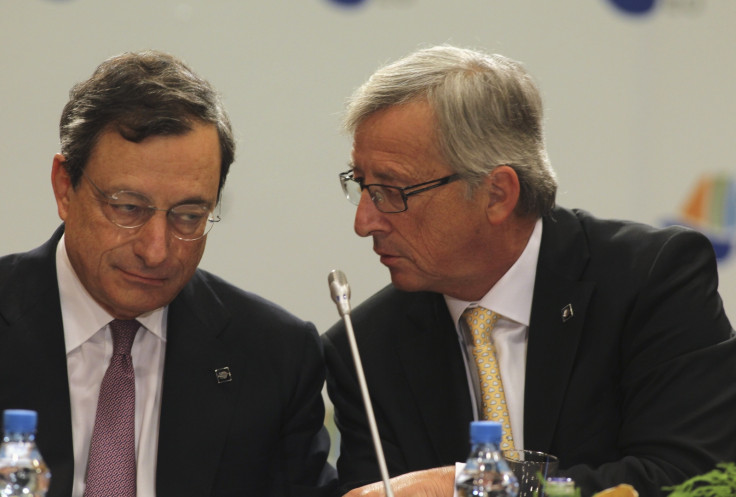Draghi and Juncker to Set Out Plans to Save Eurozone

A new European investment fund worth €21bn (£16.6bn) is to be unveiled by European Commission President Jean-Claude Juncker, as he attempts to kick-start the stagnating eurozone economy.
The Financial Times reports that the European Fund for Strategic Investment will be financed with €16bn from the existing European budget and €5bn from the European Investment Bank (EIB). It will be used as a tool for attracting private investment in a spate of infrastructure projects, which the commission hopes will be worth a total of €315bn.
The fund will offer guarantees to private financiers and is to be discussed with a view to endorsement by the 28 governments of the commission on 25 November. It will be presented to the European Parliament the following day.
The finance will be in addition to any fiscal stimulus the European Central Bank (ECB) embarks on, with analysts expecting an announcement around quantitative easing this week.
For the past year, the euro area's inflation has been below 1% - less than half the ECB's target level. Speculation has been building as to the scale and form the ECB intervention will be.
On 27 October, the bank confirmed that it bought €1.704bn ($2.16bn, £1.34bn) in covered bonds over the previous week in an effort to get more liquidity to eurozone banks.
However, analysts have warned that it must up the pace of its programme significantly if it is to return to its target balance sheet level of €1tn. It's anticipated that the bank will have to expand the scope of its purchases, buying corporate and sovereign bonds.
Late last week, the ECB President Mario Draghi described inflation levels as "excessively low" and said the bank must "do what we must to raise inflation and inflation expectations as fast as possible". He will speak in Helsinki on 27 November, at which point he is expected to layout his expansionary plans.
Analysts have suggested that the plans will also include a straight quantitative easing programme, as well as an asset purchasing programme.
On 24 November, bond yields in Spain and Italy hit record lows, with investors buying up securities in anticipation of the stimulus package, which the ECB will be intending to inject some demand into the flat lining eurozone economy.
Investors were also buoyed by better-than-expected corporate and investor confidence indices from the bloc's biggest economy, Germany.
German companies reported higher confidence than expected in November, bucking the decline of the previous six months. The Ifo business climate index rose to 104.7, up from October's level of 103.2, which was the lowest reported figure for two years.
This followed the ZEW index, which measures investor confidence and rose to 0.5 up from -3.6 in October. Analysts expect investor confidence to get a renewed boost in correlation with the boldness of Draghi's intervention.
Jennifer McKeown of Capital Economics said: "Granted, we doubt most investors think that the impact of large-scale government bond purchases would provide much of a boost to bank lending, or that they would trigger the same scale of portfolio rebalancing that we have seen in the US and the UK, given that the Fed and the Bank of England launched their asset purchases programmes when the prospective returns on other, riskier, securities were much higher.
"But we do think investors would welcome them as a means of signalling the ECB's determination to get the economy back on its feet and boosting confidence."
© Copyright IBTimes 2025. All rights reserved.






















